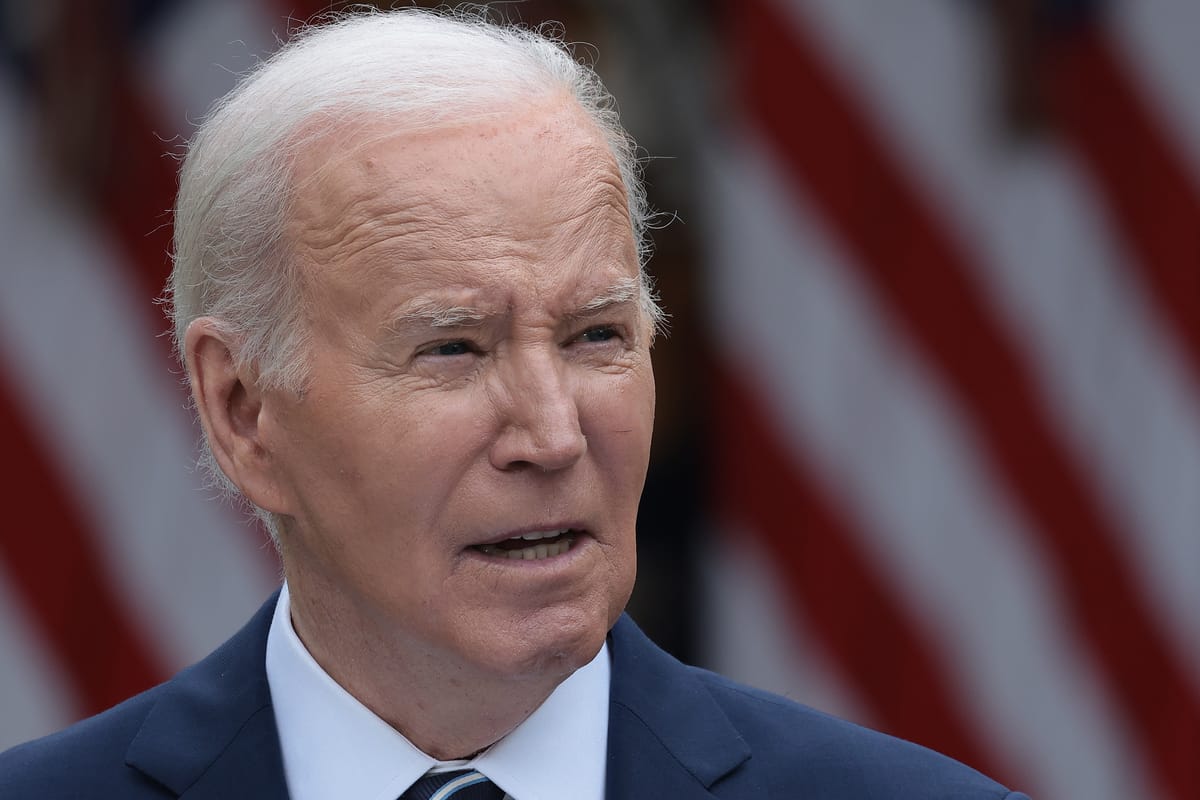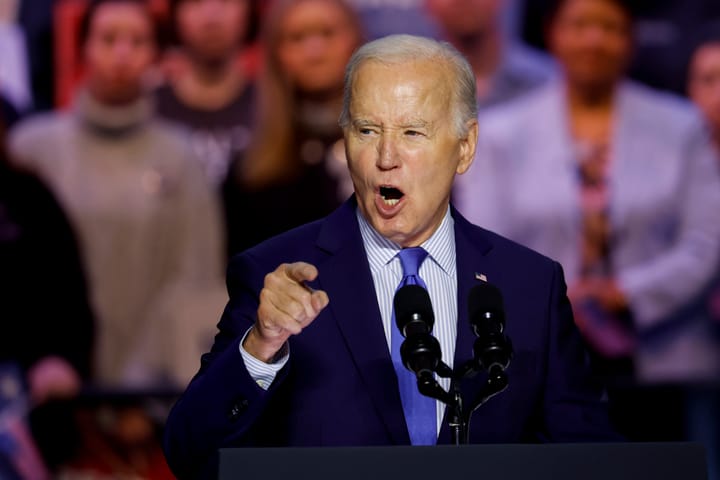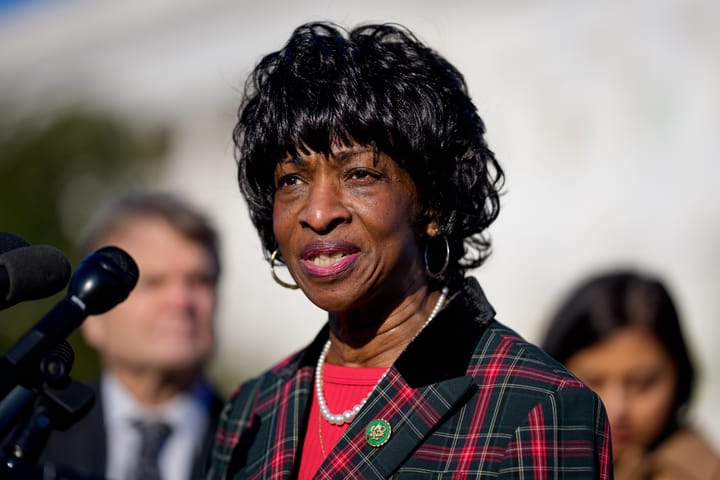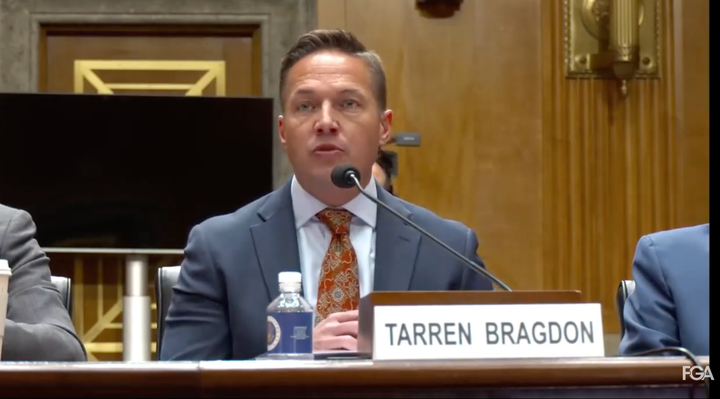In September 2022, President Joe Biden made a rare appearance in the White House Briefing Room to call on congressional Republicans to get behind a Democratic bill to end “dark money” in U.S. elections.
“Dark money erodes public trust,” Biden said. “We need to protect public trust. And I’m determined to do that.”
But that bill was never passed, and the Biden administration has not taken any meaningful actions to address the issue. For example, Democratic senators and a coalition of liberal groups have been urging Biden to begin addressing dark money in politics by issuing an executive order requiring federal contractors to disclose all of their political expenditures, but the president has not pursued the idea.
Now, Biden’s re-election campaign is set to benefit massively from dark money. At least $85 million has flooded in already this election cycle from nonprofits and shell companies that do not disclose their donors to super PACs that have pledged to spend money in support of Biden, according to Sludge’s review of Federal Election Commission records.

The main super PAC backing Biden in 2024, Future Forward, has committed to spending $250 million on digital and broadcast ads, beginning after the Democratic National Convention in August and focusing on seven key battleground states. Of the $58.9 million the super PAC has raised since January 2021, $28 million has come from dark money sources, or about half.
Future Forward has been blessed by Biden advisers Anita Dunn and Jen O’Malley Dillon to serve as the premiere super PAC backing the president’s re-election campaign, a change-up from 2020 when the Biden campaign had embraced a different PAC called Priorities USA.
The PAC’s top funder has been its nonprofit affiliate, Future Forward USA Action, a “social welfare” organization that says its mission is “to help rebuild America's middle class—and American democracy—by advancing new ideas and fresh perspectives.” On its website, Future Forward USA Action says it believes the country needs “serious campaign finance reform to reduce the influence of big corporations and billionaires on our elected officials” including “robust disclosure rules” and “reasonable contribution limits.”
By establishing a social welfare nonprofit, Future Forward is able to raise contributions of unlimited size and inject money into political groups while circumventing campaign finance disclosure rules. Indeed, moving around dark money in politics appears to be one of its core activities. Future Forward USA Action has given $24.8 million to its affiliated super PAC since January 2021. Future Forward’s dark money arm has also spent millions of dollars directly on ads for Biden, with much of its spending targeting Latino voters in swing states like Pennsylvania and Arizona. Because the ads do not explicitly endorse Biden’s re-election, the group was able to avoid reporting the expenditures to the Federal Election Commission.
Although Future Forward USA Action does not disclose its donors, some of its donors are nonprofit organizations that are required to identify their grant recipients on tax filings. By reviewing those filings, Sludge found several prominent Democrat-aligned dark money groups that have fed into it. For example, in 2022, the George Soros-founded Open Society Policy Center gave the group more than $15 million and the Arabella Advisors-administered Hopewell Fund gave it $1.5 million. Future Forward has also taken money for its super PAC from other dark money sources this cycle, including about $2 million from Way to Win Action Fund, $200,000 from Pacific Atlantic Action Coalition, and $200,000 from America Votes.
The Democrat-aligned environmental organization League of Conservation Voters last week said it would spend $120 million backing Biden in the 2024 elections, a record amount of election spending for the group. Like Future Forward, the League of Conservation Voters has a super PAC that relies on an affiliated nonprofit for much of its funding. Since January 2021, about $49.9 million of the $73.2 million that the League of Conservation’s super PAC, LCV Victory Fund, has raised has come from dark money nonprofits, or about 68%. Of that dark money total, $42.6 million has come from its social welfare group arm, the League of Conservation Voters Inc.
Although it is an independent environmental advocacy group, LCV is closely tied to the Democratic Party and it has strongly praised President Biden’s energy policy record, even as some progressive groups have been critical. When progressive groups were criticizing Biden for nominating BlackRock’s Brian Deese to lead the National Economic Council, LCV announced it was “thrilled” with the selection. When Deese entered government, BlackRock, the world’s largest asset manager, was also the world’s largest financial backer of fossil fuel projects, including coal development—yet his appointment was backed by a D.C.-based coalition of groups including LCV. On other issues, like the administration’s approval of ConocoPhillips’ Willow Project in Alaska, LCV has urged the president to reverse course.
LCV’s nonprofit arms are chaired by Carol Browner, a former Obama administration official who championed expanding natural gas production and fracking and is now senior counsel at law and lobbying firm Covington & Burling. According to her bio, Browner “provides counsel to industry leaders in the energy, transportation, and consumer product sectors” on government affairs matters. Though she is not currently a registered lobbyist, Covington’s federal lobbying clients in the energy sector include BP, Shell, and the utilities group Energy Strategy Coalition.
Browner believes climate change offers Democrats an opportunity for make electoral gains. In a 2020 memo co-authored with Biden’s new climate czar John Podesta, the pair concluded, “Politics is about drawing a contrast with your opponent and motivating your base. Few issues are better positioned than climate change to help Democrats on both fronts in November.”
Asked about its super PAC’s substantial reliance on dark money, LCV’s senior vice president of communications David Willett said, “It’s true that because of a 2023 donation by LCV to LCV Victory Fund, it currently looks like the bulk of funding is from LCV at the moment, but this is because we are still in the process of raising contributions to LCV Victory Fund in 2024 for this two-year cycle.”




